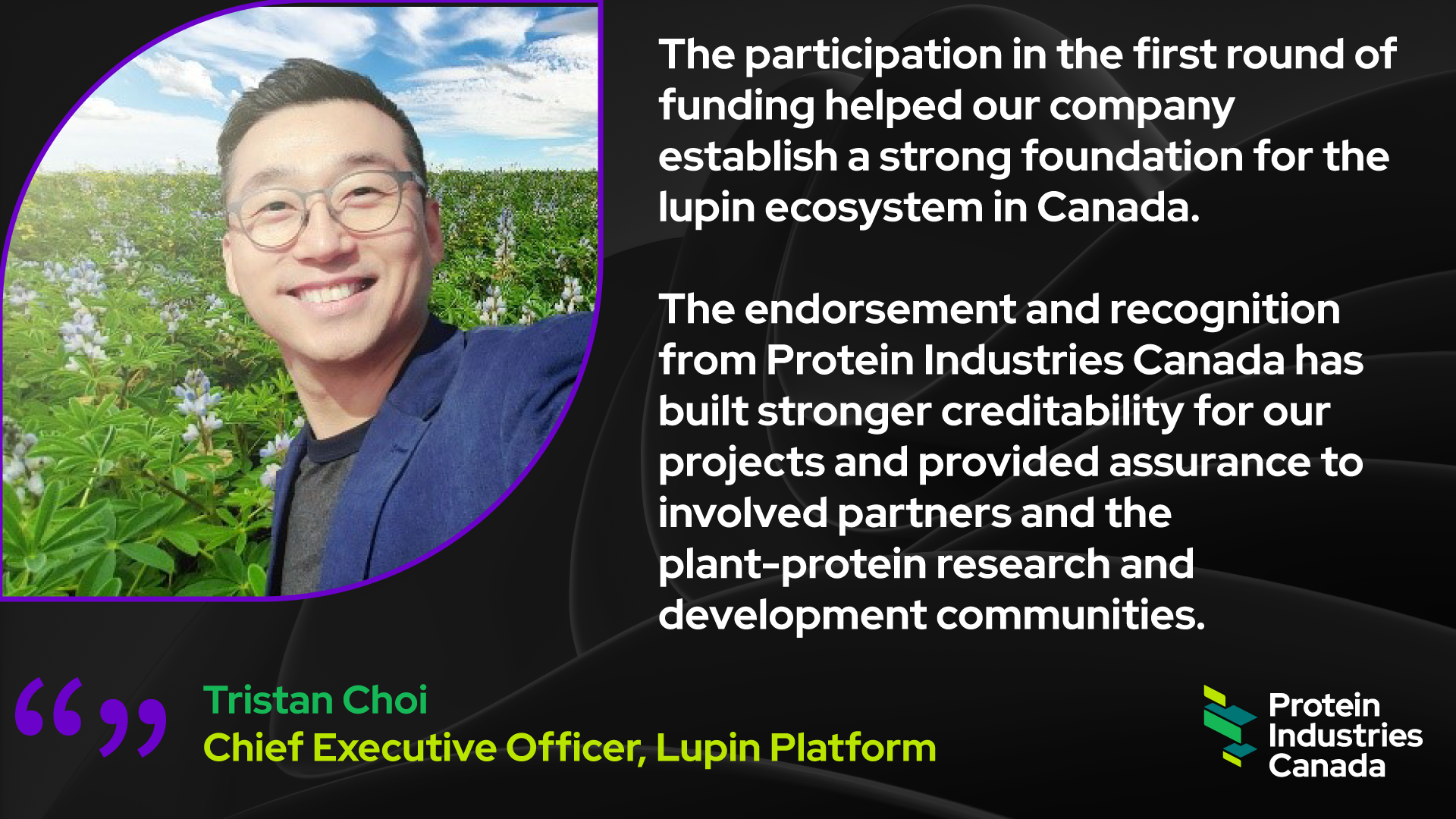Building on past success in Canada's plant-based industries
- Posted:

With increasing demand to meet global food supply and a growing need for plant-based options, Canada's agrifood sector–particularly plant-based food, feed and ingredients–is an exciting place to be.
Protein Industries Canada launched its first round of funding in 2018–with Federal Government investment–in an effort to help further establish Canada as a global agricultural leader.
The success of the first initiative can be characterized, in large part, by partnerships with innovative, forward-thinking companies that are making significant strides in the industry as they help build Canada's sustainability on a global agricultural scale.
Lupin Platform Inc., with partners PURIS, Lumi Foods and Hensall Co-op, have been focused on creating a lupin ecosystem in Canada through the development of a closed-loop farm-to-fork approach. The resulting high-value protein crop will see improved access to ingredients and response to demand while increasing diversification options for Western Canadian farmers.
"The participation in the first round of funding helped our company establish a strong foundation for the lupin ecosystem in Canada," said Tristan Choi, CEO of Lupin Platform Inc. "The endorsement and recognition from Protein Industries Canada has built stronger creditability for our projects and provided assurance to involved partners such as Farmers Network and the plant-protein research and development communities."
Another company enjoying a growing presence in the plant-based ecosystem is Wamame Foods Inc. The west coast-based business created the world's first Wagyu beef alternative made completely from plants–in a collaborative effort with partners, Merit Functional Foods, Wismettac Asian Foods, Crush Dynamics, Teja Foods and Sierra Meat and Seafood along with a co-investment from Protein Industries Canada.
"We developed Wamame as a company because of the Protein Industries Canada opportunity," said Blair Bullus, President of Wamame Foods. "Prior to that, Waygu was a brand we were trying to build and promote, but just like anything in the [plant-based] space, there is a lot of competition, a lot of investment needed and many hurdles to overcome."
With a goal to be a premium plant-based product attractive to high-end chefs first, Wamame is focused on validating it there, then attracting additional restaurant chains. The consortium is already working with the Fairmont, Sheraton and Shangri-La hotel chains in Canada and Singapore. And they're seeing other businesses, including some large sushi chains, reaching out.
"We’re at a tipping point now where we will scale quite quickly," said Bullus. "We're talking to major partners, companies with multiple restaurants rather than one or two. We want to be really strong in our niche which is a premium, muscle beef product. Hopefully, we will add Protein Industries Canada Fund ll investment.”
Choi looks ahead with exciting plans for lupin protein as well. "We'd like to continue addressing the agronomic challenges and focus our efforts on increasing acreage in Canada. We have a good understanding of lupin protein functional properties that can be used for protein-enriched food formulations." Based on their findings, the group would like to experiment with blended-protein formulation, launch their unique ingredient-based goods for retail consumers and continue expanding both their business and value-added processing infrastructure networks."
Choi and his team are particularly proud that they've laid a strong foundation for vertical integration of the lupin supply chain. "When we first approached Protein Industries Canada, investments took a value chain approach to innovation. We gained our inspiration from working with partners along the chain and implemented those metrics into our business model."
"Among the initiatives we funded and supported in Fund l," said Bill Greuel, CEO of Protein Industries Canada, "were those seeking proof of concept, especially at the ingredient manufacturing stage. In Fund ll, we want to build on those investments by helping companies scale and reach commercial product viability in the marketplace. That's a critical role for us."
Both Lupin Platform and Wamame Foods offer some insight for new potential partners considering applications for Protein Industries Canada's second round of funding.
"Be sure to have crystal clear objectives that are aligned with the scope of the Protein Industries Canada Fund ll guidelines, allocate your resources wisely, and be prudent in choosing consortium partners," offered Lupin Platform's Tristan Choi.
Bullus also encourages entrepreneurs to explore a Fund ll application. "If you are a small company looking to connect with suppliers or distributors or partnerships outside your normal ability, Protein Industries Canada will be the connective tissue within these partnerships. The downside of going through this program is almost non-existent but the upside is incredible. There is a lot of work involved but the work involved is worth the output."
